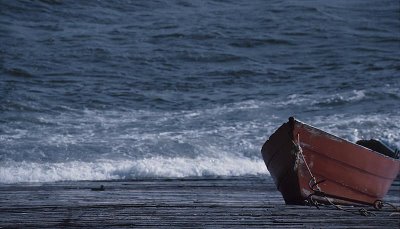They were on the road, going up to Jerusalem, and Jesus was walking ahead of them, a solitary figure against the darkening horizon. All they could do was try and keep up with him.
On the road, Jesus had taught them that the Son of Man must undergo great suffering and be killed and after three days rise again, and they couldn’t hear it. The first time it was Peter who rebuked him for saying such things. Another time, Jesus was teaching them again how the Son of Man would be betrayed into human hands and be killed, and after three days rise again. They didn’t understand what he was saying, and instead of asking him, they argued with each other about who was the greatest. Jesus was way ahead of them, and all they could do was try and keep up with him.
A third time he stopped to tell them what was going to happen to him, and the contrast couldn’t be any sharper. He saw with blinding clarity where he was headed; he spoke in great detail about the religious authorities who would reject and condemn him, about Rome’s representatives who would mock, abuse and torture him before killing him. And again he spoke about rising after three days.
James and John approached him, and perhaps they had actually listened to what he had said. Perhaps they had heard every detail about how he would run into the walls of religious certainty and political convenience, the arrogance of power and the fickleness of public opinion, and how these walls would become his grave.
“Teacher, we want you to do for us whatever we ask of you,” they said.
Perhaps they weren’t as inattentive and insensitive as we might suspect. Perhaps their confidence in Jesus’ final triumph was so complete that they ignored the dark clouds gathering ahead of them and leapt straight from the dusty road to the golden throne. In their minds, the way of Christ was but a step from all that was wrong with the world to the reign of righteousness. In their minds, they were standing at the door, their toes touching the threshold, and they could see the Risen One seated on the throne of glory.
“What is it you want me to do for you?”
“Grant us to sit, one at your right hand and one at your left, in your glory,” they replied.
They were dreaming about cabinet seats. Certainly the Messiah would need a Chief of Staff or a Vice President of Righteous Reign – and why not them, trusted friends who had been with him almost from day one?
Years ago, Dave Barry wrote about his experience as a summer intern in Washington.
The key thing was your position on the great Washington totem pole of status. Way up at the top of this pole is the president; way down at the bottom (…) is the public. In between is an extremely complex hierarchy of government officials, journalists, lobbyists, lawyers, and other power players, holding thousands of minutely graduated status rankings differentiated by extremely subtle nuances that only Washingtonians are capable of grasping. For example, Washingtonians know whether a person whose title is “Principal Assistant Deputy Undersecretary” is more or less important than a person whose title is “Associate Principal Deputy Assistant Secretary,” or “Principal Deputy to Deputy Assistant Secretary,” or “Deputy to the Deputy Secretary,” or “Principal Assistant Deputy Undersecretary,” or “Chief of Staff to the Assistant Assistant Secretary.” (All of these are real federal job titles.) Everybody in Washington always seems to know exactly how much status everybody else has.
James and John thought of God’s reign as Washington writ large, and they wanted to be near the top of the totem pole.
“Grant us to sit, one at your right hand and one at your left, in your glory,” they said.
And Jesus said to them, “You do not know what you are asking.”
The way of the cross is not some new and improved way to power and glory; it is the way of the cross. It is a way that leads to rejection and suffering because it goes against the grain of human aspirations and the logic of human institutions.
Mark has no intention of singling out James and John as more naïvely ambitious than the other disciples. Peter, James and John, together with the others illustrate the gap between the mind of Jesus and the minds of those who follow him – and all we can do is try and keep up with him.
The way of Jesus is difficult because it requires that we surrender deep-rooted ideas of power and weakness, and follow. And that surrender is not a one-time laying down of arms, but a daily letting go of control.
“Not what I want, but what you want,” is the prayer of Jesus in Gethsemane as he prepares to drink the cup of suffering, and it is the prayer of those who follow him. Not what I want – not my aspirations, my ambitions, my pursuits, but what you want – your will, your desire, your purpose.
The kingdom is not Washington writ large – the same old world with a new set of rulers on the same old thrones. The kingdom comes into the world by subverting our notions of power. It enters by undermining our desire to go all the way to the top in order to transform the world and all that is wrong with it from the top down. The kingdom entered the world in Jesus who came not to be served but to serve, and gave his life for a new way of being human.
We accept too easily that to seek control, influence, and power is simply human nature. Jesus certainly didn’t approach life that way and he revealed our true nature. He didn’t manipulate people to get what he wanted. He didn’t lord it over those who recognized his authority. He didn’t use others in the pursuit of his own personal ambitions. He was in the world as one who served God and every human life that touched his.
Now he is walking ahead of us, and all we can do is try and keep up with him on the way to God’s reign. He invites us to join him in his mission of service to all people by looking at others not as means to boost our own status and make our name great, but as fellow human beings whose desire to flourish goes hand in hand with God’s purpose for creation. He invites us to pray with him, “Not what I want, but what you want.” He invites us to quiet our ego that is so ambitious to rule, and to trust the reign of God. “Not what I want, but what you want.”
We are about to launch a ministry project here at Vine Street, homelessness: 360
For about a month we will bring together our worship, our study, and our service around the reality of women, men, and children who lack adequate housing. The causes and consequences of homelessness are complex, and nobody I know or have heard about claims to fully grasp what is needed to address and transform that reality.
Next Sunday, during lunch after worship, we will have the opportunity to talk with Jeff Blum, a Disciples minister who for over twenty years has worked in the crimininal justice system. Jeff is the Mental Health Coordinator for the Davidson County Sheriff’s Office, and in that role he sees daily how mental health issues, homelessness, and delinquency interact in ways that prevent human life from flourishing. I hope you will join us for that conversation.
Two weeks later, on November 8, Councilmember Erik Cole will be give the 2009 Roger T. Nooe Lecture for World Peace. Erik is the son of Pat and Ed, and as Chair of the Metro Homelessness Commission he has worked with creativity and dedication to bring our community together to prevent and end homelessness in our city. I hope you will be here to hear his thoughts on coordinating government programs with efforts in the business community, the non-profit sector, and Nashville’s many faith communities in addressing homelessness. There is a host of events and programs over the next four weeks, and they are all listed in today’s special insert and online.
One is especially near and dear to me, though. When Jesus tells us to seek greatness through service, I believe he is pointing to Room in the Inn, where we come together to prepare meals, make beds, open doors, and welcome the stranger under our roof. We share a meal, we share stories, we pray, we laugh and cry. For one night, the world is changed. You may not get your picture in the paper, you may not even get your name in the newsletter, but for that one night, you are part of changing the world and welcoming the reign of God.

Changing the world and welcoming the reign of God are big words. What I want to talk about in conclusion, though, is this little house. It’s little more than paper, glue, and some paint – even though it was designed by one of Nashville’s finest architects. It’s not a mansion, no matter from what angle you look at it, but it’s a house with four walls and a roof, a door and x windows.
We want at least one of these in every Vine Street household. We started production last week, and about 100 kits are ready for delivery and assembly. Each comes with a set of questions, so that every day you and your family, or you by yourself, or you and your co-workers, neighbors, or friends can spend some time thinking, talking and praying about what it means to have a home or not. And every time you do that, you drop a little piece of paper through the slot in the roof, a tiny piece of paper with a word or a sentence written on it, or a picture drawn on it.
In every Vine Street household, over the course of four weeks, a little house will collect and hold our gratitude, our hopes and frustrations, our helplessness and our commitments. And four weeks from today, on November 15, we all bring our prayer houses back to God’s house to build a city where all are at home – right here around Christ’s table.
James and John thought that in the kingdom new and better rulers would sit on the old thrones. Jesus taught them that the change required was much more significant. He challenged them and every generation of disciples after them to imagine a world where our love of God and neighbor is stronger than our ego’s ambition to rule.
Spending just a little time every day talking about what it means for us to have a home or not, may not seem like much. Setting aside just a few minutes every day to reflect and meditate on the reality of homelessness, may not seem like much. Filling a little paper house with little paper prayers every day, may not seem like much.
But the change required for human life to flourish and God’s purpose for creation to be fulfilled is not just one of political will or economic priorities or cultural attitudes. The change required is spiritual in nature, and it aims at the conversion of our imagination.
At first we may see only lots of little houses. In the end we will see the city of God.

















